“When you get upset, when you get mad, you turn red, right? When you get envious, or sick, you turn green. When you become cowardly, you turn yellow; and ya’ll got the nerve to call us colored? ” — Kevin Phillips as Leon “Neon” Edwards in Red Tails
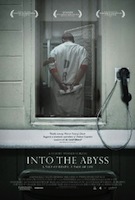 |
Into the Abyss (2011, USA) The great Werner Herzog makes a documentary, ostensibly about the last days of a convicted murderer on death row, and calls it Into the Abyss. After watching it, I think the abyss he’s referring to is not prison or death, but the lives of the doomed, seen here on full display: Michael Perry himself, a homeless-by-choice teenager who killed three people for a used Camaro; Jason Burkett, his co-murderer, a loser whose own father is serving a 40-year sentence for unrelated crimes; Jason’s brother, also a jailbird; the daughter of the murdered woman and sister of one of the murdered boys, whose father and other brother were killed by a train; a jailhouse groupie who marries Jason Burkett and impregnates herself with sperm smuggled out of his prison cell by a sympathetic guard … the is Herzog’s abyss, a horrifying plunge into the lives of the doomed. Utterly chilling, worse than you ever imagined. And what is more horrifying than anything else is that these are all quite normal looking people who speak and present themselves well. No sloped foreheads, glassy eyes, slack jaws, stings of drool. They are ALL AROUND US! Herzog, god damn you, I’ll never sleep again! |
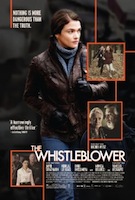 |
The Whistleblower (2010, Germany/Canada) I remember reading press reports about Kathryn Bolkovac (the woman whose story this movie is based upon) when she initially went public in 2009. I’m glad they made a movie of her story, if only to point out how outrageous it is … outrageous that it ever happened, outrageous that no one was punished (other than Bolkovac, who uncovered it), outrageous that it continues to happen. It’s facile to accuse the Serbs and Croatians of being the Tutsis and Hutus of Europe, but the fact is that UN workers and NGO contractors of all nations quickly sank to the same level. My main beef with the producers of this film is that they didn’t have the balls to identify the contractor involved, Dyncorp. That felt like a whitewash to me, and I wondered what other details were whitewashed. Not only that, the movie makes it look as if Bolkovac triumphed, when in fact her whistleblowing resulted in no corrective action whatever. It’s brutal to watch, and you’ll feel bad about being human afterward. |
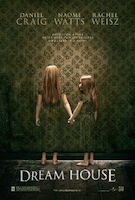 |
Dream House (2011, USA) Other than who was in it, I knew nothing about Dream House until I hit play. Never saw the trailers, never read the reviews. Probably a good thing, because then I never would have watched it, and really, it’s an okay movie. It starts off as a suburban haunted house story but very early on there’s a surprising twist and from that point on it’s a psychological mystery. What happens after the twist is predictable, though, so the second half is somewhat draggy. Still, pretty good, and I felt I got my money’s worth. There’s a bit of Shutter Island in it, also The Shining, also The Fugitive … and yet there’s enough originality left over to make it it’s own movie. |
 |
La Jetée (1962, France) Sans Soleil (1983, France) I’m rating these together because they come on a single Netflix DVD; also because both were written and directed by Chris Marker, who became legendary with these films. The first is a short science fiction story told almost entirely through a succession of still black & white photos with voice-over narration. The second is similarly narrated, but the visuals are more conventional, consisting of short color documentary film footage of Japan, Guinea-Bissau, Iceland, and San Francisco. The science fiction story is actually gripping, and I would not be surprised to learn that this short film inspired the dark sci-fi graphic novels so popular today. The second film seems at first to be an unusually thoughtful travel documentary, but it is the most unearthly documentary I have ever seen, in that the people and places pictured do not seem to be of this world. Now that I have seen it, I think it is as much science fiction as the earlier film. These movies are not family entertainment in any sense of the word. They are think pieces, and you have to be in the right mood to watch them. If you are, as I was, they are stunning and unforgettable. |
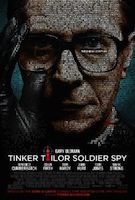 |
Tinker Tailor Soldier Spy (2011, France/UK/Germany) Several years ago the BBC made a seven-hour TV serial out of John le Carré’s novel. The novel is subtle, densely packed with details and clues, and the BBC wisely didn’t try to make it all fit into one movie-length package. Though the writers and director of this two-hour-plus movie did their best, they couldn’t squeeze it all in either. Nevertheless, they did a remarkable job: the movie fairly summarizes the novel, it has the feel of le Carré’s world of Cold War espionage, the period details are spot on, the characters true to the novels. I fear It will be a confusing and possibly dull watch for viewers not familiar with le Carré’s George Smiley novels. Those who love the novels should love the film, as I did, but they, like me, will probably want to read Tinker, Tailor, Soldier, Spy again, if only to fill in all the details and clues the movie necessarily left out or sped past. By the way, my mental picture of George Smiley has always been of someone who looks like the actor Toby Jones, who actually is in this movie, but playing another character, Percy Alleline. |
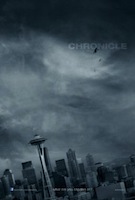 |
Chronicle (2012, USA/South Africa) I liked this one a lot. How would regular teenagers react to the unexpected gift of telekinetic powers? About like these three kids, I think, which is to say they wouldn’t quite figure out what to do with their new powers, and that their personalities would not in any essential way change. Everything stayed small-scale and curiously believable until the last few minutes of the film, when the directors go all Iron Man on us, all mayhem and destruction, and that was a disappointment. But I enjoyed the rest of the movie so much I’m giving it a high rating. Definitely worth watching. |
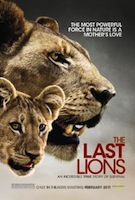 |
The Last Lions (2011, USA) I thought, right up to the end, this was a straight documentary, that the filmmakers did not manipulate the facts of the lions’ lives to make a more melodramatic story. But all that was undone, when, apparently feeling they owed family audiences a happy ending after the mother lion loses her cubs, the filmmakers miraculously arranged for one missing cub to reappear. I don’t think that was factual; I felt manipulated. Otherwise a fascinating, gripping story of life in nature (red in tooth and claw, as they say). This film will be pretty intense for soft-hearted viewers … by which I mean, if you shelter your children, you might want to rethink this as a family movie. |
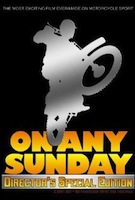 |
On Any Sunday (1971, USA) Great older movie about competitive motorcycle riding, circa 1970: road racing, dirt mile, motocross, cross-country, desert racing, trials riding, the works. Great old bikes, famous riders of the day (including Steve McQueen), fantastic filmography, infectiously exciting from beginning to end. I was grinning from ear to ear the whole time. A real classic, and if you’re a motorcycle enthusiast, a must see. |
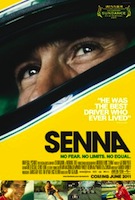 |
Senna (2010, UK) Excellent documentary about Ayrton Senna, the Brazilian Formula One driver who took the racing world by storm in the 1980s and 1990s. All the videography is composed of archival footage, edited in such a matter that it tells a dramatic and compelling story, with a minimum of talking heads. I particularly liked it that, even though we know Senna’s career will end with his death in a crash, there’s not a whisper of “death porn” in this movie, as there almost always is in any movie about dangerous pursuits such as racing … had this been an American production, the footage of Senna’s crash would have been shown over and over, in regular and slow motion … well, you know what I mean. This movie is not like that, and the viewer sees death as the drivers must see it, as a sobering occupational hazard. |
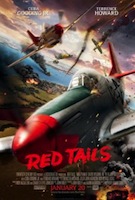 |
Red Tails (2012, USA) I wish Lucas had focused on one or two of the actual Tuskegee airmen and told their story straight, as it happened, from beginning to end. Instead, he went full Disney, and it’s impossible to take anything in this movie seriously. I give a grudging nod to the superb CGI: the mass formations of B-17 bombers are totally believable (although the dogfighting is a great deal less so in that the pilots do not appear to be pulling Gs, and some scenes, like the one where a round from a strafing P-40 causes a wooden Luftwaffe control tower to explode, are simply ludicrous). The story is too curtailed: the important stuff (how the program to train black airmen originated; what happened after the war, etc) is ignored; all that’s left is the briefest overview of the black pilots’ combat successes. And the dialog? It’s as corny as Kansas in August, downright embarrassing in places. If you have the slightest desire to learn anything important about the history of America’s first black airmen, you’re going to be awfully disappointed. Lucas had a great opportunity here; as far as I’m concerned he blew it. |